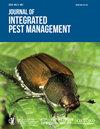认识威氏钝绥螨(蜱螨亚纲:植物绥螨科):蔬菜作物中常用的掠食性螨
IF 2.7
3区 农林科学
Q1 ENTOMOLOGY
引用次数: 0
摘要
摘要捕食性螨(Amblyseius swisskii Athias-Henriot)(蜱螨亚纲:植螨科)是一种捕食多种软体昆虫和螨害的多面手。它是一种自2005年开始商业化的生物防治剂,已成为世界上释放最多的三大生物防治捕食者之一。它通常用于抑制白蝇种群(半翅目:白蛉科),蓟马(囊翅目)和蜘蛛螨(蜱螨:叶螨科)在较小程度上。这种掠食性螨已被用作蔬菜(如辣椒、茄子、黄瓜、南瓜)和观赏作物(如玫瑰、菊花)以及一些大田作物(如棉花)的综合虫害管理(IPM)计划的一部分,但它已被证明在建立繁殖种群和抑制保护结构下的害虫方面更为成功。除猎物外,威氏钝绥螨还捕食多种食物资源,包括花粉或蜜露。当与低风险杀虫剂一起使用时,当有多种猎物可用时,当猎物和花粉自然可用时(邻近开花或伴生植物存在),或者在田间补充花粉时,它能成功地抑制害虫。如果有庇护所和食物资源,这种捕食者是在季节早期控制害虫的好选择。本文章由计算机程序翻译,如有差异,请以英文原文为准。
Meet Amblyseius swirskii (Acari: Phytoseiidae): a commonly used predatory mite in vegetable crops
Abstract The predatory mite, Amblyseius swirskii Athias-Henriot (Acari: Phytoseiidae), is a generalist predator feeding on multiple soft-bodied insects and mite pest species. It is a biological control agent commercially available since 2005 that has become one of the top 3 most released biocontrol predators worldwide. It is commonly used to suppress whitefly populations (Hemiptera: Aleyrodidae), thrips (Thysanoptera), and spider mites (Acari: Tetranychidae) to a lesser degree. This predatory mite has been used as part of Integrated Pest Management (IPM) programs for vegetable (e.g., peppers, eggplants, cucumbers, squash) and ornamental (e.g., roses, chrysanthemums) crops in open fields and greenhouses, and some field crops such as cotton, but it has been demonstrated to be more successful at establishing reproductive populations and suppressing pests under protected structures. Amblyseius swirskii can feed on various food resources besides prey, including pollen or honeydew. It is successful at suppressing pests when used together with low-risk pesticides, when multiple prey are available, when prey and pollen are available naturally (neighboring flowering or companion plants present), or when pollen is supplemented in the field. This predator is a good option to control pests early in the season if shelter and food resources are available for its establishment.
求助全文
通过发布文献求助,成功后即可免费获取论文全文。
去求助
来源期刊

Journal of Integrated Pest Management
Agricultural and Biological Sciences-Insect Science
CiteScore
5.80
自引率
3.60%
发文量
24
审稿时长
25 weeks
期刊介绍:
Journal of Integrated Pest Management is an open access, peer-reviewed, extension journal covering the field of integrated pest management. The Editors-in-Chief are Dr. Marlin E. Rice (formerly with Iowa State University) and Dr. Kevin L. Steffey (formerly with the University of Illinois). The journal is multi-disciplinary in scope, publishing articles in all pest management disciplines, including entomology, nematology, plant pathology, weed science, and other subject areas.
 求助内容:
求助内容: 应助结果提醒方式:
应助结果提醒方式:


